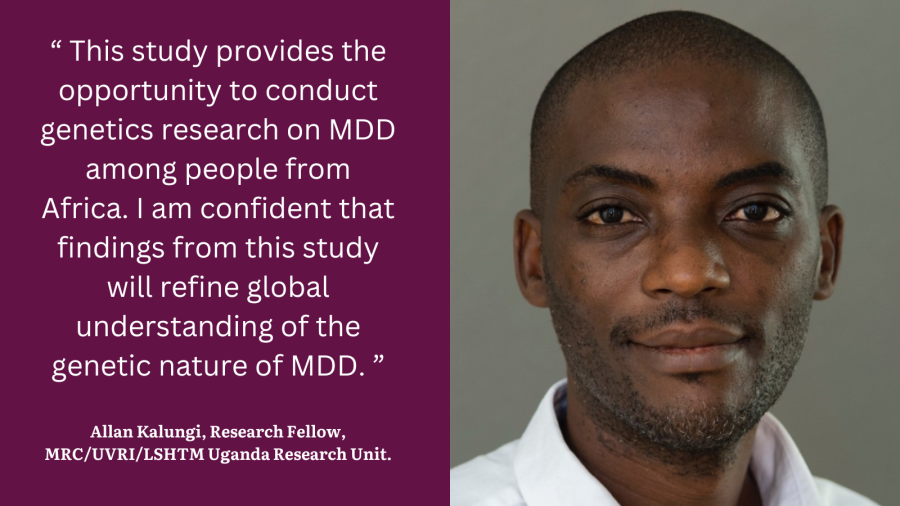
Dr. Allan Kalungi, a research fellow based at the Medical Research Council/ Uganda Virus Research Institute and London School of Hygiene & Tropical Medicine (MRC/UVRI & LSHTM) Uganda Research Unit is leading research into the genetic risk for major depressive disorder among three ethnically diverse African cohorts. Dr. Kalungi holds a bachelor’s degree in Biochemistry and a Master of Science degree in Molecular Biology & Biotechnology from Makerere University as well as a PhD in Psychiatry from Stellenbosch University. Dr. Kalungi has led other studies such as Prevalence and correlates of common mental disorders among participants of the Uganda Genome Resource: Opportunities for psychiatric genetics research and co-authored on major studies like Low and differential polygenic score generalizability among African populations due largely to genetic diversity among many others.
The five-year study addresses the lack of genetics research on MDD among people from Africa by investigating the genetic risk for MDD among 30,000 people from Eastern (Uganda, Kenya, Ethiopia), Western (Nigeria) and Southern (Malawi, South Africa) parts of Africa.
The study will also identify factors and algorithms to identify people who are at risk of developing MDD and identify population risk factors for MDD, investigate whether risk factors for MDD can be transferable between different populations and also reveal novel biological mechanisms that underlie MDD among people from Africa, which will ultimately lead to development of accepted molecules or drug targets for better management of MDD.
According to Dr Allan Kalungi, “It is known that genetics contribute to the risk of developing MDD. This knowledge has potential to lead to efficacious treatments for MDD. However, there is currently no genetic data on MDD from Africa. As genetic findings are being translated into treatments, Africans may not benefit from these discoveries if not included in this kind of research thus an urgent need to include people from Africa in global genetics research on MDD. This study provides the opportunity to conduct genetics research on MDD among people from Africa. I am confident that findings from this study will refine the global understanding of the genetic nature of MDD.”
Dr Kalungi is one of the four researchers that will be conducting this study. He will be joined by other researchers such as Dr Dickens Howard Akena, Senior Lecturer of Psychiatry at School of Medicine at Makerere University, Prof. Karoline Kuchenbecker from University College London where she leads the Diversity in Genomics group, Prof. Andrew M McIntosh, Professor of Psychiatry at the University of Edinburgh and Prof. Eugene Kinyanda, head of the Mental Health Section at the Unit.
Associate Professor Segun Fatumo, Head of the Unit’s NCD Genomics research group, Asst. Professor of genetic epidemiology at London School of Hygiene & Tropical Medicine and mentor for Dr Kalungi notes,
“Given the highest genetic diversity globally including greater percentage of private alleles which exists among DNA samples from Africans, this study has potential to identify novel genetic risk factors for MDD - which could point us to new mechanistic pathways for MDD that could, in turn, lead to new drugs and drug targets.”
This study is funded through the Wellcome Early-Career Award by Wellcome Trust Fund, a global charitable foundation that supports science to solve the urgent health issues facing everyone. Wellcome Trust fund curiosity-driven research and are taking on three of the biggest health challenges facing humanity – climate change, infectious disease and mental health. It also works with policy makers, runs advocacy campaigns, and forms partnerships with other organisations to ensure everyone, everywhere benefits from advances in health science.
About the NCD Theme
The NCD Research Theme seeks to study and understand the distinct manifestations of chronic illnesses such as diabetes, cardiovascular diseases and mental illness in sub-Saharan Africa, and their drivers, as well as develop appropriate prevention and management intervention strategies.
Learn more about the NCD research theme
Contact: press@mrcuganda.org for enquiries about the study and interviews with the study leads.
LSHTM's short courses provide opportunities to study specialised topics across a broad range of public and global health fields. From AMR to vaccines, travel medicine to clinical trials, and modelling to malaria, refresh your skills and join one of our short courses today.
